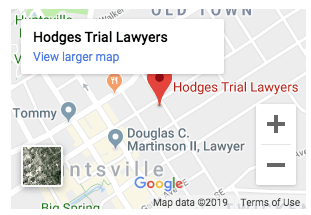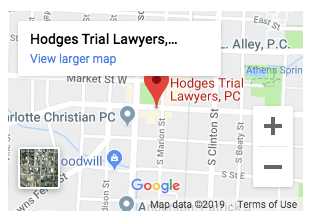Insurance adjusters play an essential role in processing claims after an accident occurs. Not only do they pay out a client’s losses, they also have to figure out how to handle losses caused by their client’s actions. This puts you—the victim—in a losing position. The insurance agent has a duty to their company and to their client, but not to you. This is why you must approach these conversations with caution and only with the assistance of your attorney.
You deserve a committed and passionate advocate as you sort through your personal injury claim. Find out how Hodges Trial Lawyers can help you by calling us at 256-539-3110.
Consider the Extensive Information in Your Health History
The insurance adjuster may be very polite when asking you to sign a form allowing them to access your medical records. While you do want to cooperate with the investigation and ensure that they have the information they need, you do not want to give them anything they can use against you.
That’s why you should think about just how much information is in your health history. Your health history will include information on every checkup you have attended, surgeries you’ve undergone, conditions you’ve had treated, medications you’re on, previous injuries, and mental health treatment you have received. It is a massive amount of information, the vast majority of which is private and irrelevant to the situation at hand. This information is very useful for your healthcare providers, but in the hands of another person’s insurance adjuster, it can be very dangerous.
The Other Party’s Insurance Adjuster Will Not Use Your Health History to Help You
First, you have to remember who the insurance adjuster is trying to help. It does not matter if they are nice or sympathetic to you—their priority is their company and their client. The best way they can support their company is by paying you as little as possible. Everything they do and every conversation they have with you is simply a way to try to get information they can use strategically.
It’s no different when it comes to your health history. They aren’t just trying to get a good understanding of your injuries and what type of treatment you need. They are also trying to find previous injuries, medical conditions, and even medications they can use to shift liability away from their client.
If you have a preexisting injury near the same spot where you’re now injured, they could easily try to claim that your injuries aren’t the result of their client’s negligence; they’re just your old injuries flaring up. If you have certain medications in your history, they may insinuate or outright claim that you may have caused the accident by being under the influence of medications. All in all, giving the insurance agent your health history will do far more damage than good.
How to Provide the Insurance Company with the Information They Need
While the insurance adjuster doesn’t need unfettered access to your entire medical history, they do need to verify your injuries and get an understanding of your treatment plan. How do you ensure that they only access what you want them to see?
This is where your attorney comes in. Your lawyer can take over communication with the insurance adjuster so you can focus on recovery. They’ll ensure that the adjuster does not get any unnecessary information that can be used against you, but they will also provide the information they need to conduct their investigation. Ideally, you should have an attorney before the other party’s insurance adjuster reaches out to you the first time. You can just provide your lawyer with the other party’s contact and insurance information.
Choose Hodges Trial Lawyers for Your Accident Claim—Call Us Today
When you’ve been involved in an accident, it’s crucial that you find an attorney you can trust to fight for you. Our team of attorneys is ready to hold the negligent party accountable for your losses, whether your case settles out of court or makes it to the courtroom. Set up your consultation now by calling us at 256-826-4129 or filling out our online contact form.



